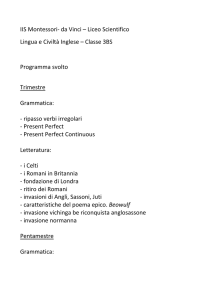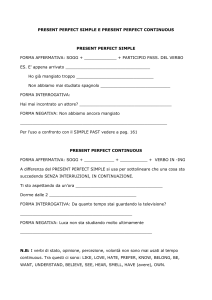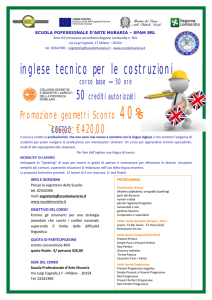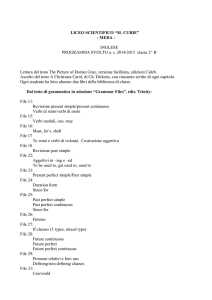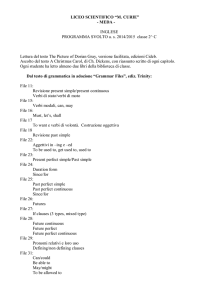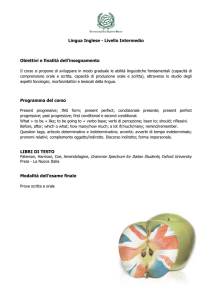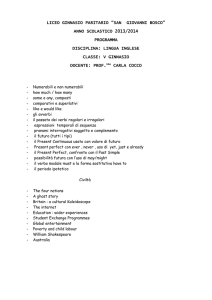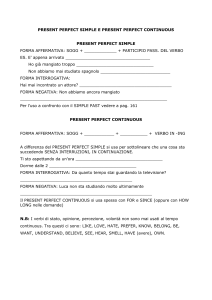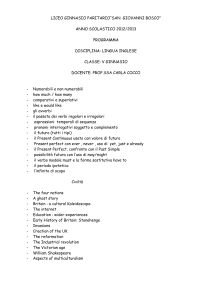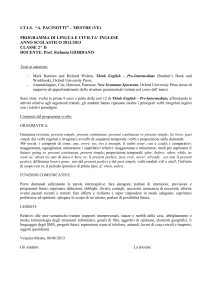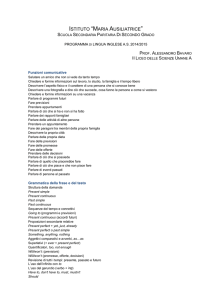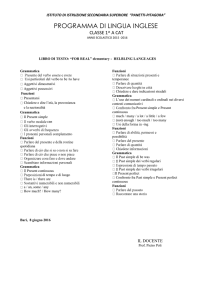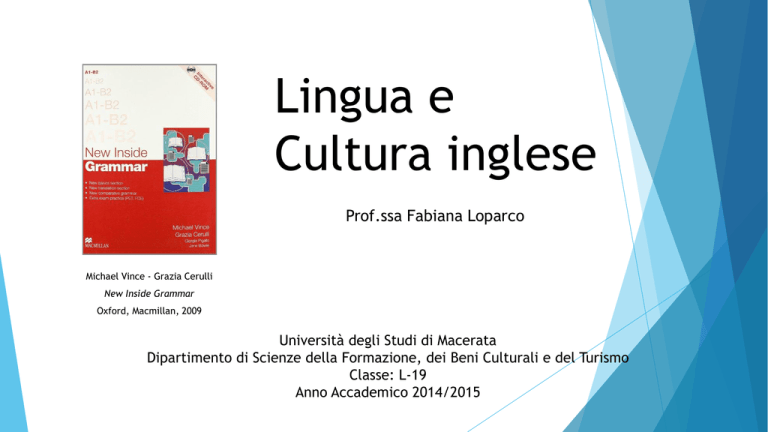
Lingua e
Cultura inglese
Prof.ssa Fabiana Loparco
Michael Vince - Grazia Cerulli
New Inside Grammar
Oxford, Macmillan, 2009
Università degli Studi di Macerata
Dipartimento di Scienze della Formazione, dei Beni Culturali e del Turismo
Classe: L-19
Anno Accademico 2014/2015
Lesson number: 3
1. Il passato prossimo (The present perfect simple)
2. Duration form
3. Il passato prossimo progressivo
1. Il passato prossimo/The present perfect simple
Si forma con l’ausiliare to have + il participio passato del verbo
Forma affermativa
Forma interrogativa
Forma negativa
I have worked
Have I worked?
I haven’t worked
You have worked
Have you worked?
You haven’t worked
He/she/it has worked
Has he/she/it worked?
He/she/it hasn’t worked
We have worked
Have we worked?
We haven’t worked
You have worked
Have you worked?
You haven’t worked
They have worked
Have they worked?
They haven’t worked
Nota: si usa sempre l’ausiliare to have anche con il verbo essere e verbi di moto:
He has been away; The train has just arrived; They have just come back
Coma participio passato di go si usa been se si intende “andato e tornato”; si usa gone se si intende
“andato e non ancora tornato”
I’ve never been to Canada (= Non sono mai stato/stata in Canada)
Paola’s gone to Canada to visit her sister. She’s staying away all month (= Paola è andata in
Canada a trovare sua sorella. Starà via tutto il mese)
Variazioni ortografiche verbi regolari
(Per le forme irregolari del verbo vedere la tabella a pp. 496-498 di New
Inside Grammar o il sito: http://www.corsi-di-inglese.eu/verbi-irregolari/elenco-verbi-irregolari-inglesi.php)
- Si aggiunge solo –d se il verbo termina in –e:
live – lived; die - died; free - freed
– La –y preceduta da consonante diventa –i:
study – studied; carry – carried; cry – cried
- La –y non muta, però, se preceduta da vocale:
stay – stayed; play – played
- Monosillabi e bisillabi con accento sull’ultima sillaba raddoppiano la consonate finale quando è preceduta
da una sola vocale:
stop – stopped; plan – planned; prefer – preferred
- Verbi terminanti in –l preceduta da una sola vocale raddoppiano la –l in inglese britannico:
travel – travelled; rebel – rebelled; in inglese americano raddoppiano la –l solo se l’accento
cade sull’ultima sillaba: rebelled, traveled
- Verbi in –ic aggiungono una –k:
picnic - picnicked
Un certo numero di verbi ha una forma propria per il passato semplice e per il participio passato
Forma base
Passato semplice
Participio passato
be
was/were
been
come
came
come
go
went
gone
give
gave
given
have
had
had
know
knew
known
read
read
read
see
saw
seen
L’elenco dei verbi irregolari può essere consultato a pp. 496-498 di New Inside Grammar o sul sito
http://www.corsi-di-inglese.eu/verbi-irregolari/elenco-verbi-irregolari-inglesi.php
Uso del passato prossimo semplice
Il passato prossimo mette in relazione un’azione o situazione passata col presente. Il tempo passato non è
quindi mai specificato, né è rilevante. È usato:
1. Per parlare di esperienze avvenute in tempo non precisato del passato (spesso con espressioni di
frequenza come never, ever, often, once, twice…)
Have you ever ridden a horse?
I’ve visited Scotland twice
ma
ma
Did you ever go riding when you were in Ireland?
When did you visit it last?
2. Per parlare di azioni che si sono verificate in un periodo di tempo non ancora interamente concluso:
this minute/week/month/year; this morning (se è ancora mattina), all day, lately, recently, in the last
few days, so far, up to now
Have you seen Lucy this week/recently?
I’ve been at home all day
ma
ma
Did you see Lucy last week/yesterday?
I stayed at home all day yesterday
3. Quando di una azione passata si vuole mettere in rilievo il risultato, l’effetto sul presente (spesso con
avverbi come just, not…yet, already)
Brian has (already) left (= He’s not here now)
The train has just arrived (= It’s in the station now) ma The train arrived a minute ago (ago
specifica il momento passato in cui il fatto si è verificato)
Uso del passato prossimo semplice
I have lost the keys (=le sto ancora cercando) ma
I lost the keys (=le ho ritrovate, l’azione
passata non influenza più il presente)
4. Dopo le espressioni It’s the first/the second time
Is this the first time you’ve visited this country?
Nota: Si usa sempre il simple past quando si danno o si chiedono dettagli su una situazione passata, perciò
nelle conversazioni si passa spesso dal present perfect simple al simple past:
• We’ve just come back from Mexico
- Have you? Did you like it?
In alcuni casi è possibile usare sia il simple past che il present perfect. La scelta dipende da ciò che si vuole
mettere in rilievo. Si usa il present perfect se l’interesse è per la situazione presente, si usa il simple past se
l’interesse è volto all’evento passato (come/in che circostanze è avvenuto, chi/che cosa l’ha causato…)
George has broken the window (the window is broken)
George broke the window (it was George who did it)
2. Forma di durata/Duration form
Il passato prossimo semplice è inoltre usato per parlare di azioni o situazioni che sono iniziate nel
passato e continuano nel presente (duration form). In italiano la stessa forma di durata è espressa con
il tempo presente, in inglese questo sarebbe un errore.
How long have you known the Clarks?
We’ve known them for about a year; since we moved to this flat, in fact
non
How long do you know…
We know them…
Nota: La durata dell’azione è introdotta da for se si specifica un periodo di tempo (for an hour/a
week/two days…); è introdotta da since se si indica il momento in cui l’azione è cominciata (since he
was born…)
Verbi come go, leave, arrive, start, begin, finish, find, lose… segnalano di norma un’azione compiuta,
quindi non si usano nella forma di durata. Frasi come “è partito da due ore” dovranno perciò essere
trasformate in “è partito due ore fa”
He left two hours ago
non
He’ve left for two hours
Osservate il significato diverso delle due frasi a seconda che si usi il passato prossimo o il passato
remoto:
How long has he lived in Germany?
How long did he live in Germany?
(he’s still living there)
(he’s not living there anymore)
Exercises
Forma delle frasi col Present Perfect Simple.
• (you/dial/the wrong number) ____________________________________
• (I/read/just/the book) __________________________________________
• (they/answer/not/my question) __________________________________
• (he/speak/not/to me/yet) ______________________________________
• (she/finish/her work/already) ____________________________________
Exercises
Forma delle frasi col Present Perfect Simple.
• You have dialled the wrong number.
• I have just read the book.
• They have not answered my question.
• He has not spoken to me yet.
• She has already finished her work
Exercises
Formula delle domande con il Present Perfect Simple.
• (you/be/to England/yet)?_______________________________________________
• (How often/she/call/you) ?______________________________________________
• (the kids/tidy up/their rooms) ?__________________________________________
• (How often/you/travel/abroad) ?_________________________________________
• (How many letters/he/write) ?___________________________________________
Exercises
Formula delle domande con il Present Perfect Simple.
• Have you been to England yet?|nelle domande yet si inserisce alla fine della frase
• How often has she called you?
• Have the kids tidied up their rooms?|I verbi che finiscono in y trasformano la y in i
dopo l'aggiunta di ed
• How often have you travelled abroad?|Quando alla fine di un verbo troviamo una
vocale + l, raddoppiamo la l nell'inglese britannico (travelled).
• How many letters has he written? | verbo irregolare write-wrote-written
Exercises
Completa le domande usando il Present Perfect e scegliendo fra i verbi indicati
visit
keep
give
eat
clean
have
• Have you ______________ your teeht?
• Have you ______________ sushi before?
• Have you ______________ a slice of cake for me?
• Have you ______________ dinner?
• Have you ______________ your room?
• Have you ______________ New Zealand?
• Have you ______________ the new James Bond film?
• Have you ______________ your homework?
• Have you ______________ them your money?
brush
see
finish
Exercises
Completa le domande usando il Present Perfect e scegliendo fra i verbi indicati
visit
keep
give
eat
• Have you brushed your teeht?
• Have you eaten sushi before?
• Have you kept a slice of cake for me?
• Have you had dinner?
• Have you cleaned your room?
• Have you visited New Zealand?
• Have you seen the new James Bond film?
• Have you finished your homework?
• Have you given them your money?
clean
have
brush
see
finish
Exercises
Coniuga i verbi tra parentesi al Present Perfect
• The policeman (write)___________________ the report
• She (not say) ___________________ a word to me
• ___________________ you ___________________ James? (see)
• We (be) ___________________ to the cinema with our friends
• She (not bring) ___________________ any cakes
• I (come) ___________________ here to talk to the manager
• I think the waiter (forget) ___________________ us
• Many people (lose) ___________________ their jobs because of the crisis
• They (play) ___________________ cards all night long
Exercises
Coniuga i verbi tra parentesi al Present Perfect
• The policeman has written the report
• She hasn’t said a word to me
• Have you seen James?
• We have been to the cinema with our friends
• She hasn’t brought any cakes
• I have come here to talk to the manager
• I think the waiter has forgotten us
• Many people have lost their jobs because of the crisis
• They have played cards all night long
3. Il passato prossimo progressivo/The present perfect progressive
Si forma con have been + la forma in –ing del verbo
Forma affermativa
Forma interrogativa
Forma negativa
I have been working
Have I been working?
I haven’t been working
You have been working
Have you been working?
You haven’t been working
He/she/it has been working
Has he/she/it been working?
He/she/it hasn’t been working
We have been working
Have we been working?
We haven’t been working
You have been working
Have you been working?
You haven’t been working
They have been working
Have they been working?
They haven’t been working
Con il Present Perfect Progressive si esprimono azioni che durano fino al presente o fino a poco tempo
prima e delle quali si sente ancora l'influenza. In questi casi l'attenzione è rivolta allo svolgimento/la
durata dell'azione
Forma in –ing: variazioni ortografiche
- La –e muta finale cade (ma la -ee rimane):
write – writing; come – coming (ma agree – agreeing)
- La –y finale è sempre mantenuta:
study – studying; carry – carrying
- Monosillabi e bisillabi con accento sulla ultima sillaba raddoppiano la consonante finale quando è
preceduta da una sola vocale:
swim – swimming; sit – sitting; refer – referring
- Verbi terminanti in –l preceduta da una sola vocale raddoppiano la –l in inglese britannico:
travel – travelling; rebel – rebelling; in inglese americano raddoppiano la –l solo se l’accento
cade sull’ultima sillaba: rebelling, traveling
- Verbi in –ie trasformano la –ie in –y:
lie – lying; die – dying
- Verbi in –ic aggiungono una –k:
picnic - picnicking
Exercises
Completa le frasi con il Present Perfect Progressive.
• Claire (teach) _______________________________ English since 2006.
• We (look) __________________________________ for that document all day.
• Mr Smith (speak) ________________________ on the phone for two hours.
• The students are exhausted because they (take) ____________________ a difficult test.
• He (live) _______________________________ here since he was a child.
Exercises
Completa le frasi con il Present Perfect Progressive.
• Claire has been teaching English since 2006.
• We have been looking for that document all day.
• Mr Smith has been speaking on the phone for two hours.
• The students are exhausted because they have been taking a difficult test.
• He has been living here since he was a child.
Exercises
Formula delle domande nel Present Perfect Progressive.
• (How long/we/wait/for her) ?________________________________________________
• (How long/she/learn/English)?________________________________________________
• (How long/they/go out with each other)?______________________________________
• (How long/you/exercise) ?___________________________________________________
• (How long/he/sit/there) ?___________________________________________________
Exercises
Formula delle domande nel Present Perfect Progressive.
• How long have we been waiting for her?
• How long has she been learning English?
• How long have they been going out with each other?
• How long have you been exercising?|e a fine parola cade via dopo l'aggiunta dell'ing
• How long has he been sitting there? |monosillabo raddoppia t perché preceduto da vocale
Exercises
Completa le frasi usando il Present Perfect Progressive e scegliendo fra i verbi indicati
wait
study
think
use
practise
feel
clean
train
rain
• ‘You look exhausted!’ Yes, I ______________________ very hard all day long!
• I ______________________ of going back to university
• She ______________________ much better lately
• Who ______________________ my computer?
• He ______________________ very hard for the London Marathon
• The streets are wet. It ______________________
• She ______________________ the house since this morning
• Waiter! We ______________________ for an hour
• How long ______________________ you ______________________ your speech?
Exercises
Completa le frasi usando il Present Perfect Progressive e scegliendo fra i verbi indicati
wait
study
think
use
practise
feel clean
train
• ‘You look exhausted!’ Yes, I have been studying very hard all day long!
• I have been thinking of going back to university
• She has been feeling much better lately
• Who has been using my computer?
• He has been training very hard for the London Marathon
• The streets are wet. It has been raining
• She has been cleaning the house since this morning
• Waiter! We have been waiting for an hour
• How long have you been practising your speech?
rain
Il passato prossimo semplice o progressivo?
Nella forma di durata si possono usare entrambe It’s been raining since this morning
le forme. La forma progressiva è però in genere
preferita
How long have you been studying English?
Con i verbi come live, work… si usa la forma I’ve been living in London for two months
semplice o progressiva a seconda che si consideri
la situazione come stabile o temporanea
I’ve lived in London since I was born
Verbi che esprimono una condizione (be, cost, fit,
mean, remain, suit), un sentimento (hate, hope,
like, love, prefer, regret, want, wish), una
I’ve known Jane for many years
conoscenza (believe, know, realize, recognize,
seem, think, understand), una percezione (feel,
I haven’t heard the telephone ring
hear, see, smell, taste, touch) e possesso o
appartenenza (belong, have) non sono di norma
usati nella forma progressiva
Il passato prossimo semplice o progressivo?
Quando si parla di attività recenti, si usa la
forma progressiva se si vuole mettere in risalto
l’azione nel corso del suo svolgimento. In questo
caso l’interesse è per l’attività in sé, non per il
risultato
Your hands are dirty! What have you been
doing?
I’ve been repairing the car
Is it working now? Have you repaired it?
Si usa la forma semplice quando si sottolinea il
completamento o il risultato di un’azione. Si usa Are you crying? No, I’ve been peeling onions.
perciò sempre la forma semplice se si specifica I’ve peeled about a pound.
una quantità o numero
Nella forma di durata negativa, la forma It hasn’t rained for four months
progressiva non è in genere usata.
non It hasn’t been raining
Nota: naturalmente la forma progressiva si usa solo per parlare di attività o azioni ripetute, non di
un singolo evento:
• Why haven’t you tidied the flat? What have you been doing all afternoon?
- I’ve twisted my ankle and I can’t move.
Exercises
Completa le frasi. Usa il Present Perfect Simple o Present Perfect Progressive secondo le regole.
• I (study) ___________________ all day, but I am afraid I (learn/not) ________________ much
• Andrew (eat) ___________________________________________ two bars of chocolate today.
• The boy’s clothes are dirty because he (play) ______________________________ in the mud.
• I (arrive/just) _________________________________________ at the station.
• We are exhausted because we (do) _________________________________ exercise all morning
• How long (you/work) ___________________________________________ for this company?
• The kids (finish/not) their homework yet____________________________________________
• Niall (watch) __________________________________________________ that film seven times.
Exercises
Completa le frasi. Usa il Present Perfect Simple o Present Perfect Progressive secondo le regole.
• I have been studying all day, but I am afraid I haven’t learnt much.|1. gap: durata → Present
Perfect Progressive|2. gap: risultato → Present Perfect Simple
• Andrew has eaten two bars of chocolate today.|risultato → Present Perfect Simple
• The boy’s clothes are dirty because he has been playing in the mud|effetto dell'azione → Present
Perfect Progressive
• I have just arrived at the station.|azione compiuta → Present Perfect Simple
• We are exhausted because we have been doing exercise all morning.|effetto dell'azione → Present
Perfect Progressive
• How long have you been working for this company?|durata → Present Perfect Progressive
• The kids haven’t finished their homework yet.|risultato → Present Perfect Simple
• Niall has watched that film seven times.|quantità → Present Perfect Simple
Per approfondire ed esercitarsi:
New Inside Grammar
Lesson & excercises
pp. 115-146
English Children’s
Literature
Charlie and the Chocolate Factory
Author: Roald Dahl
Publication date: 1964

